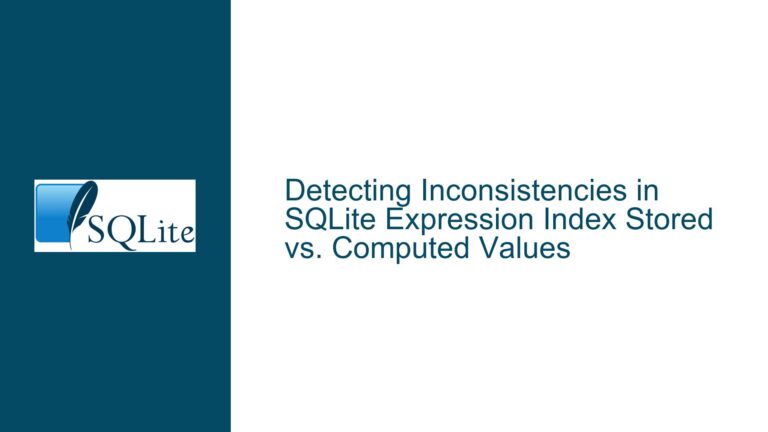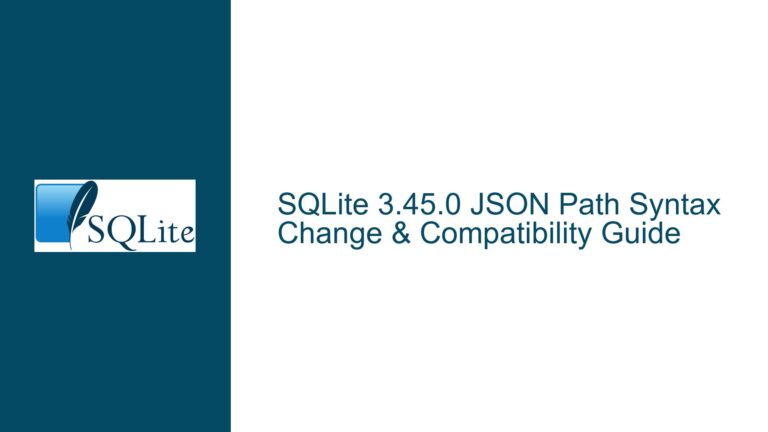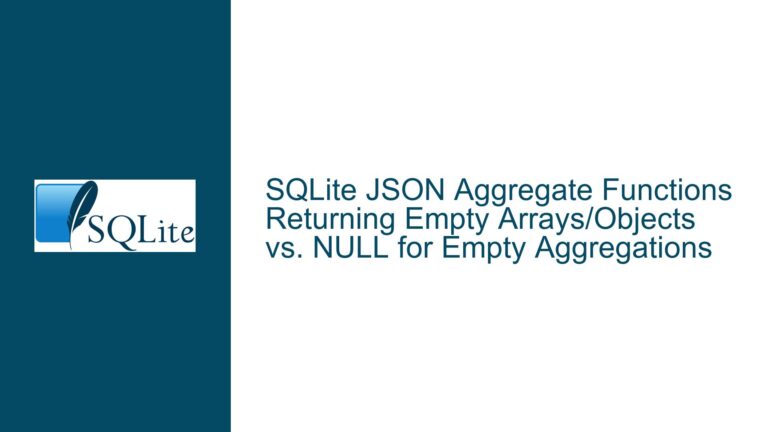PRAGMA Table-Valued Functions: Schema Column Null Issue
Understanding PRAGMA Schema Column Null Returns in Table-Valued Functions
1. PRAGMA Table-Valued Function Behavior and Schema Column Mismatch
The core issue revolves around the unexpected NULL values in the schema column when using SQLite’s PRAGMA table-valued functions (e.g., pragma_table_info). Users expect the schema column to reflect the database schema (e.g., main, temp, or an attached database name) when querying table metadata across multiple schemas. However, the schema column remains NULL in most cases unless explicitly passed as an argument. This behavior conflicts with the documentation’s suggestion that PRAGMA table-valued functions automatically infer the schema from their context.
Key Observations:
- When invoking
pragma_table_infousing the syntaxmain.pragma_table_info('t'), theschemacolumn does not reflect themainschema prefix. Instead, it remainsNULL. - The
schemacolumn is populated only when explicitly passed as an argument to the PRAGMA function (e.g.,pragma_table_info('t', 'main')). - Schema inference via function qualifiers (e.g.,
main.pragma_table_info) does not propagate to theschemacolumn, leading to confusion.
Technical Context:
SQLite’s PRAGMA table-valued functions are implemented as virtual tables. The schema and arg columns are hidden input parameters, not output columns. These parameters are bound to the function call based on constraints in the WHERE clause or explicit arguments. When the schema is not explicitly bound, the schema column defaults to NULL, even if the function is qualified with a schema name (e.g., main.pragma_table_info). This design reflects SQLite’s internal handling of table-valued functions, which exist at the connection level and are not schema-specific unless explicitly parameterized.
2. Root Causes of Schema Column Null Values in PRAGMA Functions
A. Misinterpretation of Schema Qualifiers in Function Calls
SQLite allows schema-qualified table-valued function calls (e.g., main.pragma_table_info), but this syntax does not bind the schema to the schema column. The schema qualifier in this context resolves ambiguities if a table with the same name as the function exists in a schema. For example, if a table named pragma_table_info exists in the main schema, main.pragma_table_info refers to that table instead of the PRAGMA function. If no such table exists, the qualifier is ignored, and the connection-level function is invoked. The schema column remains NULL unless explicitly provided as an argument.
B. Hidden Column Binding Mechanics
The schema and arg columns are input parameters to PRAGMA functions. They are bound via constraints in the WHERE clause or positional arguments. For example:
SELECT * FROM pragma_table_info('t', 'main');
binds arg = 't' and schema = 'main'. In contrast:
SELECT * FROM main.pragma_table_info('t');
does not bind schema = 'main' because the schema qualifier does not map to the hidden schema parameter. This leads to schema being NULL.
C. Overriding by User-Defined Tables
If a user creates a table with the same name as a PRAGMA function in a specific schema (e.g., CREATE TABLE main.pragma_table_info(...)), SQLite prioritizes the user-defined table over the PRAGMA function. Queries like SELECT * FROM main.pragma_table_info will access the user-defined table, which lacks the schema column entirely, causing errors or unexpected results.
D. Documentation Ambiguity
The SQLite documentation states that PRAGMA arguments and schemas are passed as function parameters but does not explicitly clarify that schema qualifiers in function calls (e.g., main.pragma_table_info) are unrelated to the schema column. This leads users to assume that the qualifier implicitly sets the schema parameter.
3. Resolving Schema Column Null Issues: Methods and Best Practices
Solution 1: Explicitly Pass Schema as an Argument
Always pass the schema name as the second argument to PRAGMA functions. This ensures the schema column is populated:
SELECT * FROM pragma_table_info('t', 'main');
This binds schema = 'main' and arg = 't' correctly.
Solution 2: Avoid Schema Qualifiers for PRAGMA Functions
Do not use schema prefixes (e.g., main.pragma_table_info) unless you intentionally want to reference a user-defined table. Use the unqualified function name and pass the schema as an argument:
-- Correct
SELECT * FROM pragma_table_info('t', 'main');
-- Incorrect (schema column will be NULL)
SELECT * FROM main.pragma_table_info('t');
Solution 3: Use WHERE Clauses to Bind Schema
Bind the schema column using a WHERE clause constraint:
SELECT * FROM pragma_table_info('t') WHERE schema = 'main';
This explicitly binds the schema parameter to 'main'.
Solution 4: Avoid Naming Conflicts with PRAGMA Functions
Do not create tables with names matching PRAGMA functions (e.g., pragma_table_info). If such tables exist, drop or rename them:
DROP TABLE main.pragma_table_info;
Solution 5: Validate Function Behavior
Test PRAGMA functions in a clean environment to rule out naming conflicts:
ATTACH DATABASE ':memory:' AS test;
CREATE TABLE test.t(x INT);
SELECT * FROM pragma_table_info('t', 'test');
If the schema column is NULL, verify that no conflicting tables exist.
Solution 6: Update Queries to Use Proper Syntax
Refactor existing queries to use the correct argument order and avoid schema qualifiers:
-- Before
SELECT arg, schema, * FROM main.pragma_table_info('t');
-- After
SELECT 't' AS arg, 'main' AS schema, * FROM pragma_table_info('t', 'main');
Solution 7: Leverage Connection-Level Functions
PRAGMA functions are connection-level objects. Use non-existent schema qualifiers to force the use of the PRAGMA function:
SELECT * FROM non_existent_schema.pragma_table_info('t', 'main');
This bypasses any user-defined tables and ensures the PRAGMA function is invoked.
Final Recommendations:
- Always pass the schema as an explicit argument to PRAGMA functions.
- Avoid schema qualifiers unless resolving naming conflicts.
- Audit databases for tables named after PRAGMA functions.
- Use
WHEREclauses or positional arguments to bind parameters.
By adhering to these practices, users can ensure the schema column is correctly populated and avoid unexpected NULL values.






